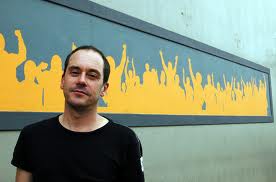Poet Charl-Pierre Naudé gives a guest lecture
09.03.2015
 The lecture takes place Friday 13 March 2015 13:15 Novum 101 A. The South African poet Charl-Pierre Naudé will read his poetry in English. All welcome.
The lecture takes place Friday 13 March 2015 13:15 Novum 101 A. The South African poet Charl-Pierre Naudé will read his poetry in English. All welcome.

Charl-Pierre Naudé (1958) is one of the most interesting living South African poets. His two books of poetry Die nomadiese oomblik (The Nomadic Moment, 1995) and In die geheim van die dag (Against the Light, 2004) earned him various prizes. Naudé’s debut was hailed in the South African literary world as one of the strongest books of poetry of the 1990s. In reviews Naudé was called a strong, metaphysical poet, a distant relative of John Donne. This was a volume which gave South African poetry hope, because the poet created a fresh world of references, away from the poetry dominated by Apartheid. In 1997 Naudé was awarded the prestigious Ingrid Jonker Prize for Die nomadiese oomblik. His second volume, In die geheim van die dag (translated as Against the Light), won him the M-Netprys for Poetry.
Naudé was born in Kokstad in kwaZulu Natal province and grew up in Durban and East-London, on the South African coast. After studying literature and philosophy at the University of Stellenbosch he settled in Johannesburg as a journalist.
Naudé is no stranger to the Netherlands. In 2000 Poetry International in Rotterdam devoted a translation project to his work. Translations of his poems have appeared in both Dutch and Flemish magazines. Gerrit Komrij in his massive anthology of Afrikaans poetry, selected no fewer than eight poems from Die nomadiese oomblik, which is a lot for a debutant.
There are certainly influences in Naudé’s work: Vallejo, Ritsos, Neruda, Amichai, Carver, Milosz, and the South African poets Breyten Breytenbach, N.P. Van Wyk Louw and Elisabeth Eybers. About his poetry Naudé says: ‘I don’t see myself and my poetry as synonymous. I don’t know whether I always agree with them. We are friends, yes, as long as they don’t try to convert me. There is a margin of difference between an author and his poem. In that margin lies the magic of poetry. I want to navigate towards that difference, which is inexplicable at best. That is what I pursue. It encompasses the autonomy of poetry. Poetry is an organism we have become one with, but which moves independently at the same time, thinking for itself. Poetry is a “speaking in languages.”’
© Robert Dorsman (Translated by Michele Hutchison)